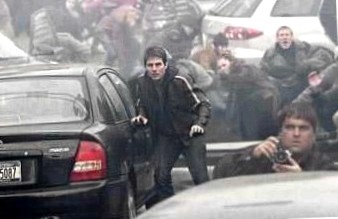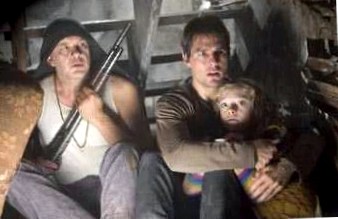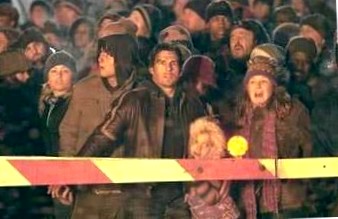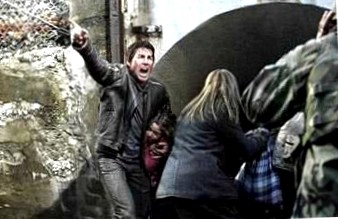"war of the Worlds" Bundled the insistence of our age
"war of the Worlds", Steven Spielberg’s between $ 130 and $ 200 million expensive H.G. Wells filming, is a Spielberg, as he is in the book, and at the same time pure regressive zeitgeist. He shows chaste and conservative "America Under Attack" and is paid by the legitimate return of social arkyism. His figures are heroes of jerking: Tom Cruise in the main role is not a camphor, but a walker, but one who murdered at the crucial moment even an innocent than this threatens to be threatened to danger for his daughter. So bundled "war of the Worlds" sent the insistence of the age: before attacks of the terrorists, before the decline of the power of the West and still: before the nuclear war. And in front of technology such as biology in one: the aliens are cold, amoral-intelligent combat machines, at the same time superior nature. The pictures are sometimes impressive, the root tone surprising Duster, the overall impression tricky disparate, while placing in places, ultimately but over long routes Zah and boring.

Is it just coincidence that just the most successful director of the world, Steven Spielberg has never paid a love story? That he does not want to report much to women, that his adults are always rough boys who have to get themselves with their vadres or equal children? What our popular culture at Spielberg’s fabrics so fascinated, which has not really been asked – but it could cooperate with the absence of a man’s hero-bastard femininity, and insofar as to the waiver of the compulsion to grow up.
Once again, Spielberg has "war of the Worlds", his conversion and Americanization of H.G. Wells are famous for the future novel, a fabric found in which he can tell exactly what he always does not pay. Herbert George Wells’ (1866-1946) Future novel "War of the Worlds" Gehafen since his appearance in 1898 to the most influential texts of the cultural history, far beyond science fiction. For the first time, the invasion of an Auberrish power to earth was described here – the book is the prototype of all the inconvenientest works that vary this motif. Wavs’ Perspective Primar is a social philosophical: I care about the effects of the action for humanity. As in the laboratory, he examines how people in a fundamentally changed situation behave. Wells was quite every way the opposite of Spielberg: a pessimist, politically engaged in the social liberals "Fabian Society", which has experienced a whole politician generation in the Great Britain and that in addition. At all the spab and some effects of effects, Wells was also criticized imperialism and a sarcastic satire on British colonial rule. His Marsians were "Head, nothing but head … a blobe brain quantity". "Without the body, the brain had to become a very selfish spirit than with this foundation of human feelings."
Aliens ballers on everything
What may probably have staved Gamesberg irritated at this substance? Ironically, the director who comes with "Eerie encounter of the third kind" and "E.T. – The Auberdirk" Two rare examples of that genres created that the encounter with other life forms does not pay as a negative, instead, instead, with mystery and moments of poetry, gives her even humanity. Especially e.T. describe the "Alien" as a cute beings, the encounter with him as a patient. Therefore, the film was repeatedly interpreted as an expression of the political unconscious of his creators and their intention to shake interesting strangers in the mainstream cinema as positive, interesting, for openness and tolerance. Both films of Spielberg, despite all stylistically, as politically restorative growth of the director, contributed significantly to his reputation as one of the few real liberal Hollywoods.

"war of the Worlds", If you want to take him as seriously in his subtexts, that could now change. Because this time the aliens are uncompromising Bose and moral. With spaceships and with all sorts of technical device they come to the earth. Without being argued to negotiate, even to explain, put whole cities in rubble and ash, ballers on everything that moves, dead people or take them trapped – but only, like huge insects equipped with a uberdimensional suckler to suck your blood. It does not seem to give a remedy against you, unrestrained by resort they drove their extermination war, their goal is "The Extinction" – A certainly deliberated linguistic analogy to the experience of fascism, which was already for Orson Welles’ Horplay version of the substance at the time of the Munchner Agreement and the invasion of the invasion of the Sudentenland. In front of them flees an American family – deputy for "all of us". Because here only people want "home".
Nobody had at the beginning of the 21. Century believed that our world was observed by a power that is well considered. While people entered their diverse interests, they observed and studied us. With immeasurable self-falliness, humanity play the globe – of its rule on this world always certainly. But out of the depths of the ALLS’s mighty, ice cold and compelleless beings full of envy on our planet. And slowly but certainly they forged their tarpaulin against us…
"war of the Worlds" is a mixture of horror and disaster film, enriched with the usual ingredients of almost all Spielberg movies: a car as a printing and protective chamber. A little sub child, at first glance naive and naosely, then behind all innocence but smarter than the adults. A father who cute a fragmented, divergent family together again and thus wants to treat themselves. A failure that at the right moment then wife what to do.
A man who lensly failed to be unattended – sacrifice of economy, war or modernization – and then also discovered by the special challenge in itself at once unexpected kaffe, and himself – and a little of us all – cures in view gross. Cinema as a moral institution that the true values, the "What really pays", releases as a public schaubuhne of the American Dream and the Family Values. Everyone can do it if he only wants, but he also wants to do it with a view to good goals.
Out of the Bloden Nationality
Trauma and forgiveness, therapy through practice and identity determination in the communical sense – that’s exactly this story, Spielberg finds in Wells’ novel, which he, apparently without rough breaking in the reality of the contemporary America transplanted. It is an America in which the catastrophe that will follow is prasent from the beginning. Less than a shadow of past events – "of the 11.September" for example – as a secret hope. Disasters, who knew that better than the contemporary cinema, are always a yearning horizon. You open the chance to improve, changing at least, promise the new beginning of all things. And offer a valve for relief of self-hatred, which has a culture in itself. Who fouls Klammhimlich, who can make the disaster or simulation particularly well to free themselves from the debt.
So it’s at least Ray, the hero of the film played by Tom Cruise, which is more than the Aliens his own guilty culprit, the unobstructed knowledge as a father is to be a failure. The woman wow away him, and now gets a child of another, smoother, faceless. Ober’s weekend, he is said to hat the two common children: the son, who, just at school, writes a trade work on the French colonization of Algeria, and the little one, as I said nasal daughter. because "war of the Worlds" Initially, at the beginning of the catastrophic genres, he introduces Ray together with a few other X-arbitrary people in their everyday life context, in the bloden normitat of a grubby White Trash America, which has been buried in Oden predators his private dreams long ago. Spielberg is just filming these early sections as a juxtapy in his own start as a director, social-realistic, dark and dirty, full of dressing the style of the "New Hollywood" the 70s, but with coarse-grained digital camera. The viewer may be certain that this everyday life will be irretrievably destroyed very soon at Dessrose way.
With the arrival of the aliens, the catastrophic stuck is then soon to the horror movie. First of all, there are still a few concessions to the young, manual action-fixing audience: exploding fireball, laser beams that burn people to ashes, rather unnecessary and confused, any logic contradictory carjunde. Then the scenery is always "smaller", Intimate, also claustrophobic. In the car, Ray and his children flee over city, country, river Gen Boston – probably hardly randomly the capital of the US revolution. And at the statue of a revolutionary father and daughter also go over as they ended up, very shortly before the happy end, reached their destination.
This journey is also again considered as a psychological drawn. Parallel to the threat of aliens, the understanding of Rays for his children woke his responsibility and his courage. On their journey they meet small fragments of the remaining America: apartments and advised, the often scenes of well-known films, people who are surprised again and again of a gross irretrievable loss – no movie Spielberg is a one in which the grief for a lost, Actually, America has already disappeared so dominant.
At the same time, Spielberg does not make any illusions here regarding society – in relation to the family, however, very well. Wells’ novel, as I said, describes the collapse of civilization by an experience that she has not grown. The question of the behavior of the people in the crisis he answers surely pessimistic, and Spielberg does not add anything to that. Even Ray does not escape the Ursunde, and murder a principle innocent man who has helped him shortly before, because he could now, confused and desperate, could become danger for the daughter. He seems as part of the filmmaker even to forgive the murder – because obviously the protection of his own brood justifies every moral impregnation, when humanity has always been involved in the state of nature. You can say: also Spielberg drove us here – additionally ironised by the clake of Sinatras "IF I Rule the World." – So our close to the Aliens, the collapse of the social in chaos. But he shows the bad of human nature, where he could show the good, or the difference between those who were socialized in a high culture, and those who did not have the gland.
The legitimate return of social arkyism
Spielberg, very time spirit, shows a "America Under Attack" and stages the triumph of the "Was Against Terror" as a legitimate return of social warwinism. More than humanity is the moral security of America, the safety of good deeds, threatened by the Aubertird. Noteworthy is the discourse of the militar, which the movie only slightly hides slightly hidden, and for its evaluation the information can not hurt that the Pentagon for the shooting 400 soldiers faced for the effect, Spielberg had to commit himself in return, his scenes to be absorbed by the militar. You can see them, with cannons, rockets, tanks, aircraft, only the atomic bomb lacking this time, because you probably will not even throw against aliens on their own people. Everything stays unsuccessful. But again better insight and surplus sensation, the soldiers. And during father Ray obviously is a printberger who does not take much from the militar, especially when it’s in safe death, his son is quite brave Ami-patriot. Only one can still see him on tank and spurt: Idealism is stupid. A few minutes later he let Papa and sister down to – "I need to do this, please let me go." – to become a soldier. He too, the wife of the experienced Spielberg-Gucker, will not die, but at the end of the family group photo deus-ex-machina-mabig reappear – the nuclear family stays at Spielberg always intact. Or almost, because it takes a second part to see how Ray back his ex.

A love story does not pay Spielberg this time. No woman with any even starting testing potential appears in front of Cruise eyes, threatens him to alienating him to his new father’s role. The only woman in his life is his daughter. and at some point the son will be gone, and daddy with daddy’s girl alone, and then you have the true, selfstred all and even mocks love history of the movie. The daughter of the daughter of the father who always stays with her. The son of the father who let him go.
Spielberg dresses the collapse in places very impressive, even apocalyptic pictures: A burning train in a raging ride, a stitched, with tricky intact airplane. In the best moments also reminds again at Genre classic like "Thereafter" or "Mad Max", to the 70s and Fruhen 80s, as the body snatcher and zombies on the screen the American province’s boots and blobed their true nature.
In contrast to those films, Spielberg can not take his beliefs on the best – at the latest he will then again become the director of the industry, the present and the mainstream. Also the end of this film is, like the whole two hours earlier, peppered with reference to early own movies. We see a dying alien, who can no longer call home, but still raise the index finger as a short gesture of the meaning. Then the "war of the Worlds", Without real showdown over. Ray has delivered his daughter in Boston. The aliens disappear as they came, they die because they have grown man, but not the bacteria and parasites that meet them on earth. As an ecological message, however, this happy end should by no means misunderstand.
What Jorge Luis Borges praised so at Wells will not be saying about Spielberg: "Nothing is preparing me", he writes, "such pleasure like his scary miracle reports. I mean, you should take as the thesession or how the ahas history in the general thought of the genus." What our popular culture is fascinated in Spielberg’s fabrics, is obviously that you can leave for him, so depressed everything can, on the happy end. That one with him also after an 11.September is not worried, but released with good feel. There are regressive films with child-keusen heroes, propagated on the irrelevance of adult life. Because that had to mean for our Hero Ray, for finally to do without his ex-wife, as in the Puritan compulsion to be a perfect father.

Something in the viewer, however, Spielberg does not take this Happy End, he does not spurt that this movie actually paid out of the destruction – and that he also allows him to do this, in turn, Spielberg’s strong. He saves his figures, but the joy of it remains sometimes stuck himself in his throat.